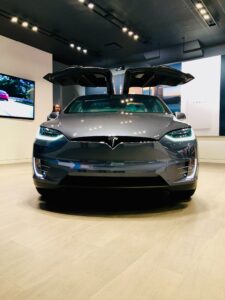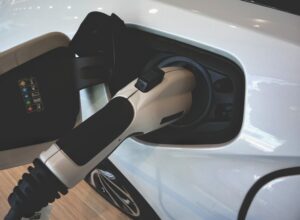There is a buzz around Electric Vehicles! In 2021 305,000 Electric Vehicles (EV) were registered, a 74% increase on the previous year. It is a market that does not look like slowing down with the EV market holding a 25% share in 2022.
In 2020 the Government announced the ban on new petrol and diesel cars from 2030 and whilst this does not mean you will have to get rid of your petrol or diesel car at this date it does impact anyone looking to buy a brand-new car, which may particularly affect business owners leasing brand new vehicles. 
There are various benefits to EV, but are they the best thing for you? This article aims to shed some light on EV’s and answer the questions you are probably asking yourself.
They are better for the environment, aren’t they?
The largest single benefit of electric cars is the improvement they make to air quality in towns and cities. EDF energy quote that one electric car can save an average of 1.5 million grams of CO2 in a single year. This is the same as FOUR return flights from London to Barcelona.
However, we also must consider the effect on the environment of producing the cars and the electricity used to fuel the car.
Due to the production of lithium-ion batteries the emissions when manufacturing an electric car are higher than a conventional car. A BBC article estimated that producing an electric Vauxhall Corsa uses roughly 12 tonnes of carbon dioxide (CO2) compared to 6.7 tonnes producing a petrol equivalent. For reference, the total annual carbon footprint for an average UK person is roughly 12 tonnes.

Further to this, the same BBC article, which included a road test in a Vauxhall Corsa, found that fewer than 1 in 3 miles driven were powered by renewable energy negating some of the environmental benefits of driving a fully electric car.
With the price of fuel rising, I’m bound to save money?
It takes roughly 3-4 years of use for an electric car to become cheaper than a petrol equivalent, depending on the car and your mileage. The time is likely to extend for drivers doing lower miles and vice versa for drivers doing higher miles. This tipping point is likely to come sooner as new prices continue to fall and fuels prices continue to rise.
When considering the cost of ‘filling up’ it costs roughly £18 to charge a Tesla Model S enough to drive 379 miles. Comparing this to the cost to cover the same distance in a Fiat 500 – TwinAir (one of the most economical petrol cars on the market) would cost £21. This is a saving of roughly £75 per year, based on driving around 9000 miles a year.

Furthermore, there is no road tax currently payable on fully electric cars and for Hybrid cars you can also expect to pay less in road tax. Although, this is all dependent on the emissions of the vehicle.
However, when considering running costs we must also consider that the purchase price of EV is higher than comparable petrol cars due to the cost of the batteries, which make up around 30% of the list price of the car. An example of the disparity in price is, a petrol Fiat 500 Red is £16,475 brand new whilst the electric equivalent is £31,485.
The ‘engine’ has fewer moving parts so maintenance must be lower?
According to various articles, EV drivers pay around half as much to repair and maintain their vehicles. This is due to the drive train often being far simpler and therefore requiring less maintenance. There are elements of the vehicle which wear quicker on EVs such as tyres however, components such as brakes are hardly used, due to a process called regenerative braking. Elon Musk claimed in 2018 that Tesla brakes “literally never need to be replaced for the lifetime of the vehicle”, although we may want to take that with a pinch of salt.
It is also prudent to consider the battery repair and replacement; whilst manufacturers often offer comprehensive warranties (8 years with Jaguar, Tesla, Nissan and Renault) there is a worry for the battery degradation. Tesla compiled data from a proportion of the vehicles and found on average as little as a 7% degradation in 250,000 miles.
I’ve heard they are much easier and nicer to drive?

Looking beyond the cost and environmental benefits of electric cars, they are incredibly fun and easy to drive. Electric motors produce their maximum power from standstill meaning improved acceleration and unrivalled responsiveness particularly around town. Less noise and vibrations from combustion engines and fewer gears to worry about, makes them an easier all-round drive.
Will I suffer from ‘range anxiety’?
Range anxiety is the worry you get when fuel drops dangerously low and the risk of coming to a complete stand still. This also happens in petrol and diesel cars (for some, others see it as a game) however the infrastructure for EV charging stations has been criticised recently.
On average, electric cars have a full range of 200 miles. For most people this is sufficient for day-to-day activities but for long distance driving you will need to plan a route and ensure you can access rapid charging points.
There are nearly 20,000 charging points in the UK with the majority distributed in the South of England with less in rural areas, similarly to petrol stations. CarWow have a handy Charging Point Finder which allows you to plot your route. The vehicles range in their speed of charge, for example; the Tesla Supercharger takes 40 minutes to charge from flat to full – make sure you have a book to read!
The government have outlined plans to improve the infrastructure by pledging £1.6bn to install 300,000 public charges by 2030. It is clear that we are in a period of demand outstripping supply for both EV and public charging stations but for most people providing you charge your vehicle at home prior to travelling, then range anxiety will not be a problem.
Doesn’t the Government help me to purchase an electric car with various grants?
There are a variety of grants available for purchasing electric cars, some of which are available to individuals as well as business owners. Until March 2022 the Government offered a grant to subsidise charger installation at home. This is still currently available to those who rent or live in a flat. The voucher is also still available to Business Owners for installation on office premises and the voucher entitles you to up to 75% of the cost of installation up to a maximum of £350, for up to 40 sockets.
For people who have a company car the Benefit in Kind (BIK) tax is drastically reduced for electric vehicle, currently 2% from the 22/23 tax year. To give an example this would save you £1,280 a year when having an E-Golf compared to a Golf GT 1.5litre petrol.
Business owners also benefit from 100% capital allowance deduction on electric car purchases meaning a £40,000 car could amount to tax relief of £7,600 in the first year.
The final government grant is the Plug in Car Grant (PICG) which means that approved manufacturers and dealerships can pass up a discount of up to:
- Car – up to 35%, capped at £1,500
- Mopeds – up to 355, capped at £150
- Motorcycles – up to 35%, capped at £500
- Small Vans – up to 35%, capped at £2,500
- Large Vans – up to 20%, capped at £5,000
How do I know my EV will sell in the future and will I lose money?
The cost of owning a car is affected by its residual value when you come to sell it. The residual value also affects your monthly payments if taking out finance using Personal Contract Purchase (PCP). Due to electric car prices stabilising and with some popular models increasing their prices, it is predicted that if you purchase a car today by the time it is five years old, they will be worth more than their petrol and diesel equivalent.

In conclusion there are lots of variables which will impact on you buying an EV, no more than the rising cost of both electric, petrol and diesel and the amount of mileage you do as a driver. The EV market is relatively new, compared with petrol or diesel and therefore it is expected in the years leading up to the 2030 deadline, we will begin to see EV prices reduce and the environmental benefits increase.
There are lots of articles and useful tools available online to help you decide on your next car purchase, but I hope this article gave you an insight into the EV market and some of the consideration.

